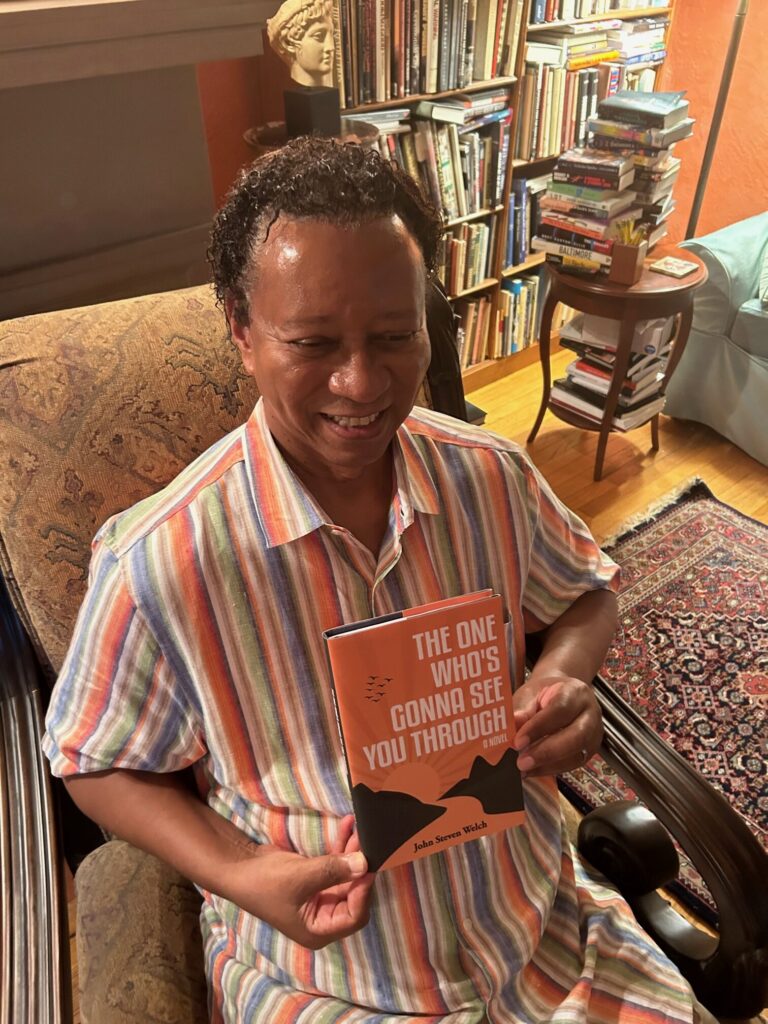

Can you tell us a little about yourself?
I was born and grew up in Washington, D.C. during the 1960s and 1970s. I attended parochial
schools there and have lived primarily on the East Coast between Washington and New York
most of my life. As a graduate student studying Art History, I was faced with the choice of either
becoming an academic or working in art museums. After completing my M.A. and while
pursuing my doctorate, I began working in art museums because I wanted to teach the public
about art. I pursued a career as an art educator in museums for some 15+ years.
I always had a love of writing and suspect I harbored a repressed dream of someday writing
novels while I was pursuing a career in museums. When I stepped away from full-time
employment in 2012, I began focusing on writing. First, as a consultant working on arts related
projects, then later, more exclusively on creative writing. I began writing my first novel, The One
Who’s Gonna See You Through in earnest around 2022. Fortunately, with my husband’s support,
I was freed to completely immerse myself in a passion that had been dormant for years.
Tell us about a bit about your book
In a word, the book is about a young gay black boy raised by a loving illiterate father and it is
quite different from the usual coming of age story.
At ten years old GJ’s father killed a man who was trying to kill him and GJ. And GJ becomes the
principal witness at a trial for his father who is then acquitted. Also, at age ten, GJ has no
confusion about his sexual identity and he comes out to his father who loves, accepts, and
supports him. Also, at ten, GJ has his first sexual experience with a tough older kid from the
neighborhood. So, it was quite a year. But nothing to what came next. GJ’s life changed radically
after that.
At 14, he began a seven-year relationship with a 37-year-old partner. He was a fly-on-the-wall of
the black gay bar scene in DC during the late 1970s, and he also watched The Waltons, and he
loved John Boy because John Boy wanted to write, and it planted the seed in GJ that he too
wanted to write. He also had a bigger dream of romance which changed his life.
At age 21, GJ ends his relationship with his first partner because GJ is intellectually curious, he
wants a bigger life, and his partner wants to be comfortable. GJ is a romantic and he does not
love his partner in the deeply romantic, idyllic understanding he has of romantic love and he
decides its best to breakup. And that opens the door to events that will entirely change his life.
Also, by age 21, GJ has dropped out of college and he meets an intellectually ambitious, white,
Yale educated, 26-year-old Congressional staffer who will become the great love of his life, and
he begins to realize his dreams. He goes from being a college dropout to earning a Bachelors
from Columbia University and a PhD from Princeton.
Have you always wanted to become a writer?
The desire to write has always been with me though I have just recently reconnected with my
ambition to write fiction. As I mentioned earlier, I became enthralled with the John Boy
character on The Waltons as a teenager. My greatest attraction to that character was his
determination to write.
What has helped or hindered you most when writing a book?
The biggest challenge to writing was batting away all the beloved and practical tasks of life and
home that can distract from sustained writing on any given day. Some days there is just too much
life and living to write as much as one would like. But, as a writer, one must find the right
balance.
What inspired the idea for your book?
In my reading of Coming-of-Age literature and gay fiction more generally, I had not found an
example of a story that encompassed all the themes I wanted to see in that type of literature. I
wanted to tell a story about a poor, black kid growing up gay-identified with a single father
rather than a single mother, who bore no confusion about his gay identity, but instead grappled
with insecurities about race and class. I wanted to portray the relationship between a black gay
son and his father that was not abusive but rather wholly supportive, nurturing and loving. I
wanted to explore the ways such a protagonist pursued a romantic idyll of love and partnership in
his life and how he achieved realization of such a love. And, I wanted to tell a story of a gay man
who experiences a life-long and sustaining love rather than promiscuity and loneliness.
Ultimately, I wanted to tell an uplifting story about identity, love, acceptance, and self-
actualization that would hopefully resonate with many different types of audiences.
What advice would you give a writer working on their first book?
Actively absorb knowledge and advice about all aspects of writing and publishing but always
follow your gut in making decision about your own path as a writer. It is an extremely subjective
business, even when it intends otherwise.
What is the most valuable piece of advice you’ve been given about writing?
Listen and observe far more than you speak. To write is to see and interpret your world.
Where do you get your information or ideas for your books?
Everywhere. Book ideas flow from your mind, heart, and observations. Information that may
inform your creative writing can come from any dimension of our vast world.
Social Links:
www.jswelchbooks.com (author website)
https://www.facebook.com/john.welch.3705157
instagram.com/welchjohnsteven
www.linkedin.com/in/john-steven-w-1